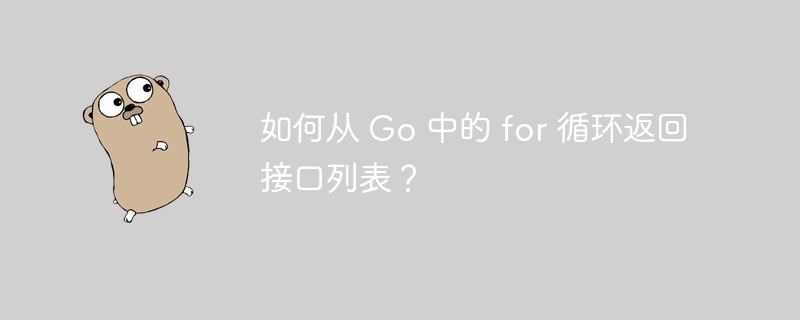

In Go language, we can traverse data structures such as arrays, slices, and maps through for loops. However, sometimes we need to return a list of interfaces in a loop. This is a common requirement because an interface is an abstract type that can represent multiple concrete types. This article will introduce how to use a for loop in Go to return a list of interfaces. First, we need to understand the concepts of interface types and type assertions in Go.
How to return the interface list from a for loop in go? Suppose I have the following data:
| id | name | project_type |
|---|---|---|
| 1 | project_name | 1 |
| 2 | project_name | 1 |
| 3 | project_name | 1 |
| 4 | project_name | 2 |
| 5 | project_name | 2 |
| 6 | project_name | 3 |
| 7 | project_name | 3 |
| 8 | project_name | 3 |
| 9 | project_name | 4 |
| 10 | project_name | 4 |
I can use the following go code to get two lists of project_type=1 and project_type=2,
func (d *db) projectlist(type, uid string, size uint64) (interface{}, interface{}, error) {
type resp struct {
name string `json:"name"`
id string `json:"id"`
projecttype string `json:"project_type"`
}
var project_type_1 []*resp
var project_type_2 []*resp
sql = fmt.sprintf(sql, where.string())
_, err := d.ctx.db().selectbysql("select * from project where project_type=1 order by rand() limit 10").load(&project_type_1)
_, err = d.ctx.db().selectbysql("select * from project where project_type=2 order by rand() limit 10").load(&project_type_2)
return project_type_1, project_type_2, err
}
But now the data of project_type is 's json[{"project_type":1,"name":"something else"},{"project_type":2,"name":"something else"},{ "project_type":3,"name":"something else"},{"project_type":4,"name":"something else"}], project_type is greater than 2, I must get an interface{} list, I tried to rewrite the code as below, but I don't know what to write next, how to return the interface list from a for loop in go? Thank you for your suggestion.
func newprojectlist(d *db) ([]interface{}, error) {
var s = make([]projecttype, 0)
data, err := d.querystring("project_type")
if err != nil {
return nil, err
}
err = json.unmarshal([]byte(data), &s)
if err != nil {
return nil, err
}
for _, shorttype := range s {
fmt.println("this is shorttype", shorttype)
}
return nil, err
}
If you want 10 results per project_type (all 10*n results):
func (d *db) projectlist(type, uid string, size uint64) ([]interface{}, error) {
type resp struct {
name string `json:"name"`
id string `json:"id"`
projecttype string `json:"project_type"`
}
// get all types, you can get it from db
// example: select distinct projecttype from project
types := []string{"1", "2", "3", "4"}
ans := []interface{}{}
for _, stype := range types {
var project_type []*resp
sql = fmt.sprintf(sql, where.string())
_, err := d.ctx.db().selectbysql("select * from project where project_type=" + stype + " order by rand() limit 10").load(&project_type)
ans = append(ans, project_type)
}
return ans, nil
}If there are a total of 10 results for all types:
i write it if you need it
The above is the detailed content of How to return a list of interfaces from a for loop in Go?. For more information, please follow other related articles on the PHP Chinese website!




